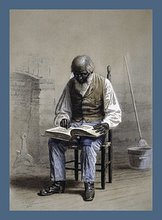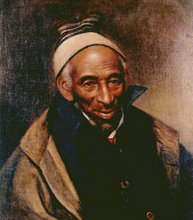The book by the eminent scholar of the Middle Ages, Regine Pernoud, Women In the Days of the Cathedrals, has this to say on the abolition of slavery as a byproduct of the rise of Christianity:
Is it not surprising that this change represented by the disappearance of slavery has not been more strongly emphasized? Schoolbooks do not mention this social fact whose paramount importance seems to have escaped historians. The return to slavery at the time of the Renaissance should nevertheless have attracted their attention to the revier process that had started as early as the fourth century. The institution of slavery, where the slave-thing was totally deprived of any right, as in the Roman world, could not long surive the spread of the gospel. Already, in the fourth century, the freedom of slaves had been made much easier, and from the time of Constantine, of the reforms stipulated that the members of a slave's family could no longer be separated from him. This implied that the slave had a right to marriage and family, a right that until then had been refused him. Finally, the role played by the Church in actual emancipations was enshrined in the Code of Justinian, which declared that a stay in a monsastery made with a view to entering it annulled every type of slavery. Justinian had abolished the Roman law of the later Emperor that forbade the emancipation of more than one hundred slaves at a time. Church councils never ceased to enact measures to make the fate of slaves more human and gradually to have them recognized as human beings. Thus we can measure progress between the Council of Elvira in 305, which imposed seven years' penance on anyone who had killed his slave, until the Council of Orleans (311), where the right of asylum in churches was proclaimed for fleeing slaves, and the Council of Eauze (551), which automatically emancipated a slave whose master forced him to work on Sundays. But in order to understand the evolution that had taken place, we much remember the Council of Elvia took place in the midst of a fully pagan society, where the murder of a slave was in no way considered a crime since it was legally permitted.
We can also mention the Councils of Orange (441) and Arles (452), in which it was declared that masters whose slaves had sought asylum in a church could not seize the priets' slaves in compensation. A whole study should be made, which up to now has only been started within the strict limits of the judicial code, tracing the influence of the Christian mentality as little by little it impregnated morals and eventually influenced civil legislation as such. In the fifth century St. Caesarius exclaimed, in answer to those who blamed him for having paid for the emancipation of slaves, "I would like to know what those who criticize me would say if they were in the place of the captives I am redeeming. God, who gave himself as the price of man's redemption, will not reproach me for redeeming captives with the money from the altar." Furthermore, the books that studied the various acts applied to the tribunals all contained by the sixth and seventh centuries various formulae for emancipation granted for religious reasons.
Therefore, we have to conclude that during this reputedly brutal period perhaps the greatest change in social history occurred: the slave, who had been a thing, became a person, and he who was thereafter called a serf could enjoy the essential rights of a person. Delivered from that power of life or death that his master once had over him, he could also now have a family and a home and lead his life as he wished, with the sole restriction that he remain on the land according to forms that can more easily be studied when concentrating on the feudal age as such.
Saturday, February 10, 2007
Subscribe to:
Post Comments (Atom)



1 comment:
As regards Christianity and the Bible, slavery was by no means a monolithic institution. A very good study on this is found at, http://www.christian-thinktank.com/qnoslave.html
In the New Testament, in which the Christians had no power to change laws, and opposition might have made it worse for slaves, slavery as an economic practice was tolerated, but in which it was required of Masters, "give unto your servants that which is just and equal; knowing that ye also have a Master in heaven" (Col. 4:1), and mistreatment was forbidden (Eph. 6:9), and even the escaped slave Onesimus was to be treated as a brother, not a servant, if indeed he should be required back at all (Philemon v. 16). Moreover, slaves were encouraged to obtain freedom if they lawfully could get it (1Cor. 7:21).
Later as real Christians has power to change laws the outworking of the gospel helped lead to the freedom from slavery.
But the greater bondage, freedom from which was and is to be the primary concern of a true church, is that of bondage to sin, which ultimately will make one far more miserable than physical slavery.
And everyone serves something or someone. Jesus Christ, who served others selflessly and sinlessly day and night, and then took responsibility for our sins and paid for them with His own precious blood, and who now reigns in Heaven, is the only One that can set us free. And as was told slaves, "if thou mayest be made free, use it rather" (1Cor. 7:21).
Give your sins and life to Him to died for you and rose again, and then follow Him,. Therein is true freedom.
Post a Comment